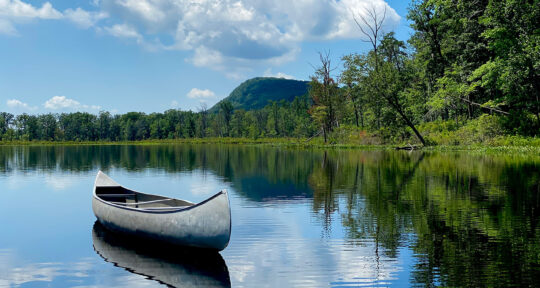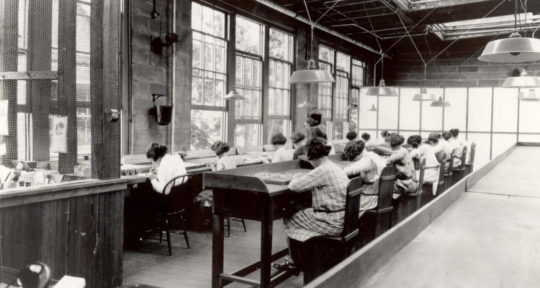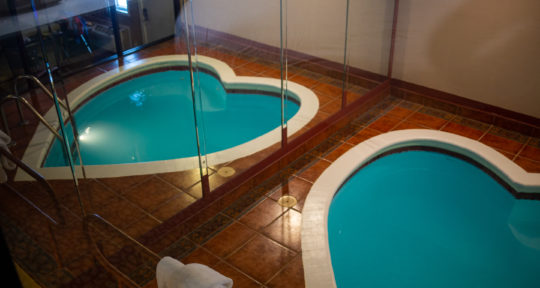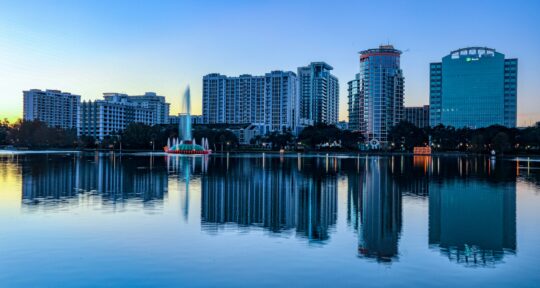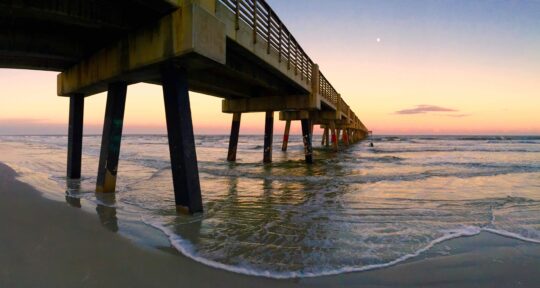In October, 2016, I took my mom to Atlantic City for her birthday. She enjoys feeding her money into slot machines; I prefer to exchange mine for dusty souvenirs. Since the early 1800s, the city, located on a barrier island off the coast of New Jersey, has offered ample opportunities to do both. Pre-pandemic, it felt novel to explore a ghost town or resort in its off-season. Post-apocalyptic landscapes are often most notable not for what remains, but for what is missing: the people.
Places become abandoned similarly to how most living things die: slowly, and then suddenly all at once. Atlantic City, at least as a destination, has been dying for decades. When we visited five years ago, you could almost hear the death rattle outside of the Trump Taj Mahal, where workers had been on strike since July. The casino and hotel, billed as the “eighth wonder of the world” when it opened in the spring of 1990, made its debut like most big dreams in the last two decades of 20th-century corporate America: with a laser and fireworks display.
The Taj Mahal—built at a cost of nearly a billion dollars—had 120,000 square feet of gaming space and 2,010 guest rooms. Housed beneath the gilded bulb domes were multiple restaurants, gift shops, show rooms, and the nation’s first casino strip club. But after a few decades of hosting high (and low) rollers, the Taj Mahal closed its gold-trimmed doors in October of 2016. It has since reopened as the Hard Rock Hotel and Casino, but another former Trump property was not as lucky.
-
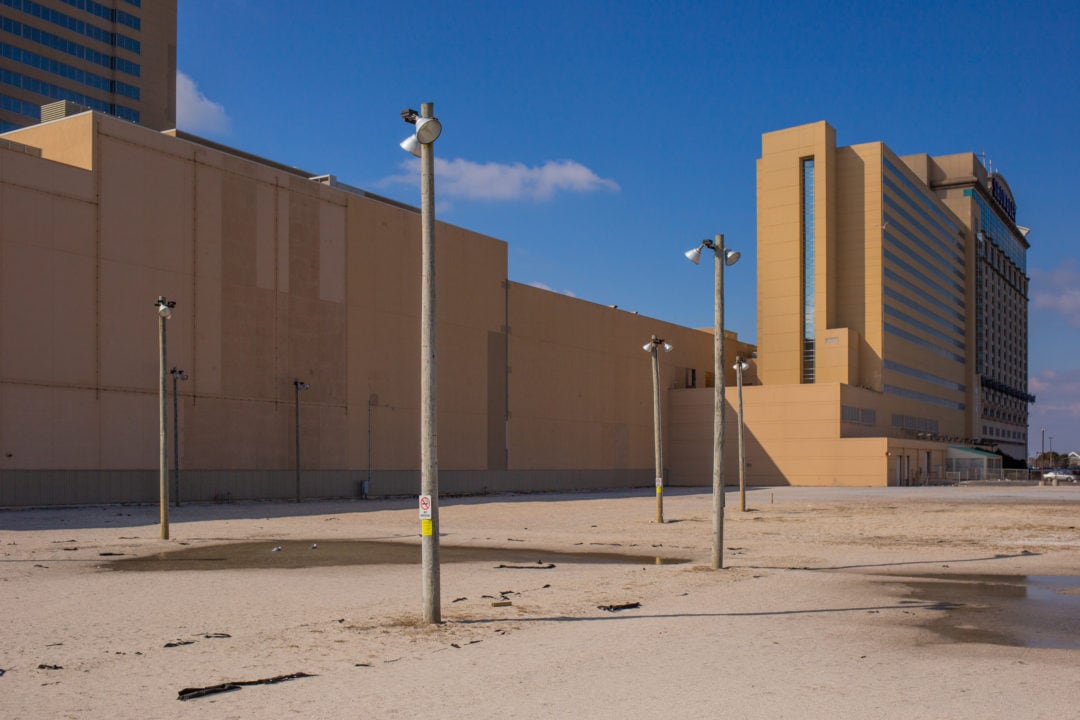
A desolate stretch just off the boardwalk. | Photo: Alexandra Charitan -
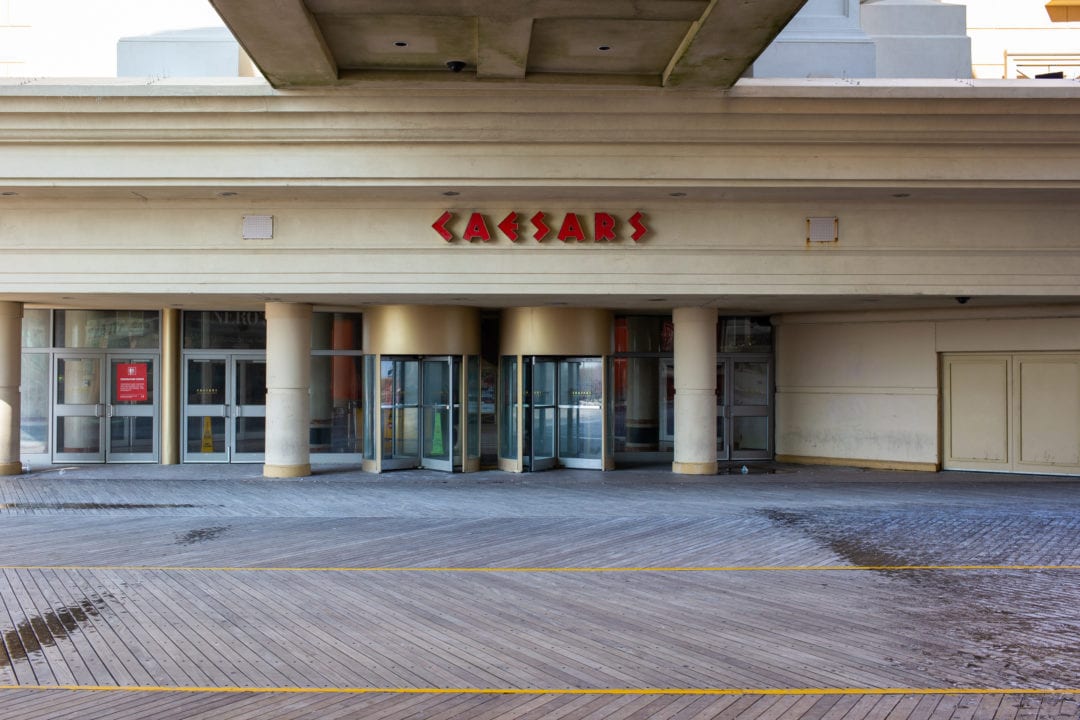
The boardwalk entrance to Caesar’s. | Photo: Alexandra Charitan -
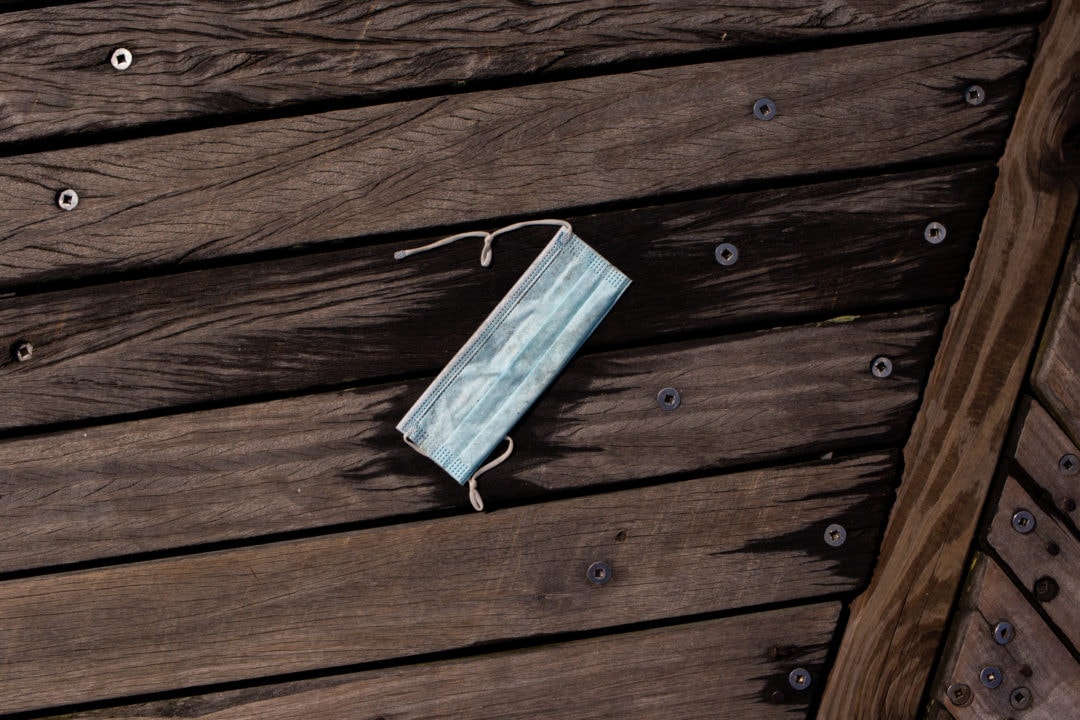
A discarded face mask on the boardwalk. | Photo: Alexandra Charitan -
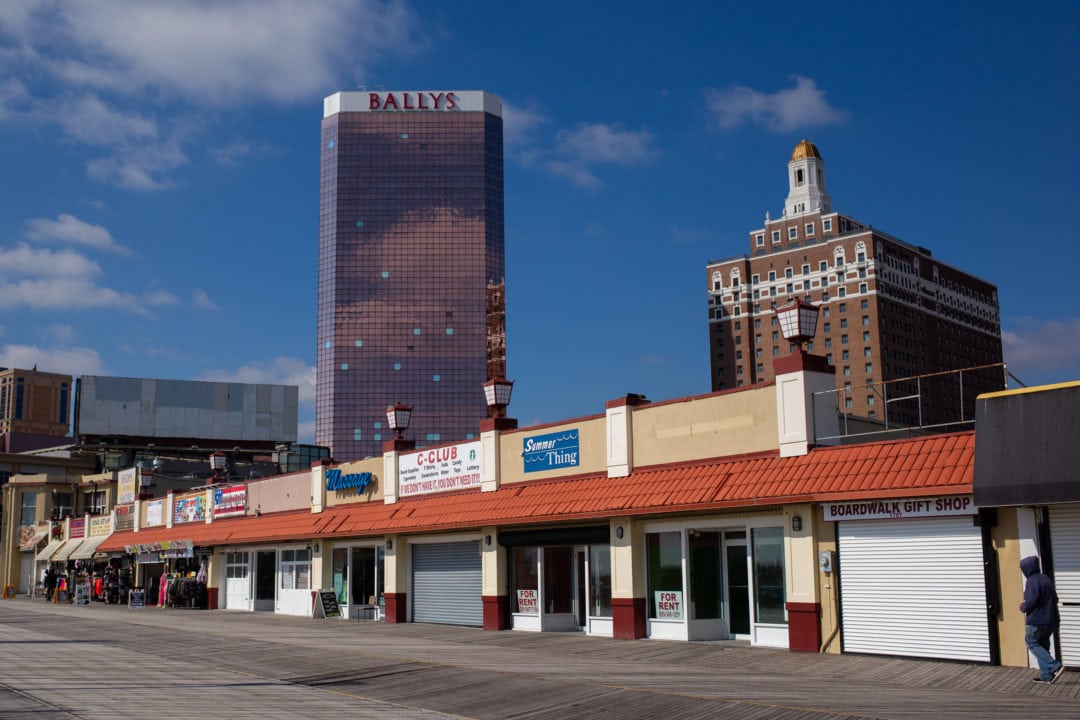
Businesses are still struggling to attract tourists after a months-long shutdown. | Photo: Alexandra Charitan -
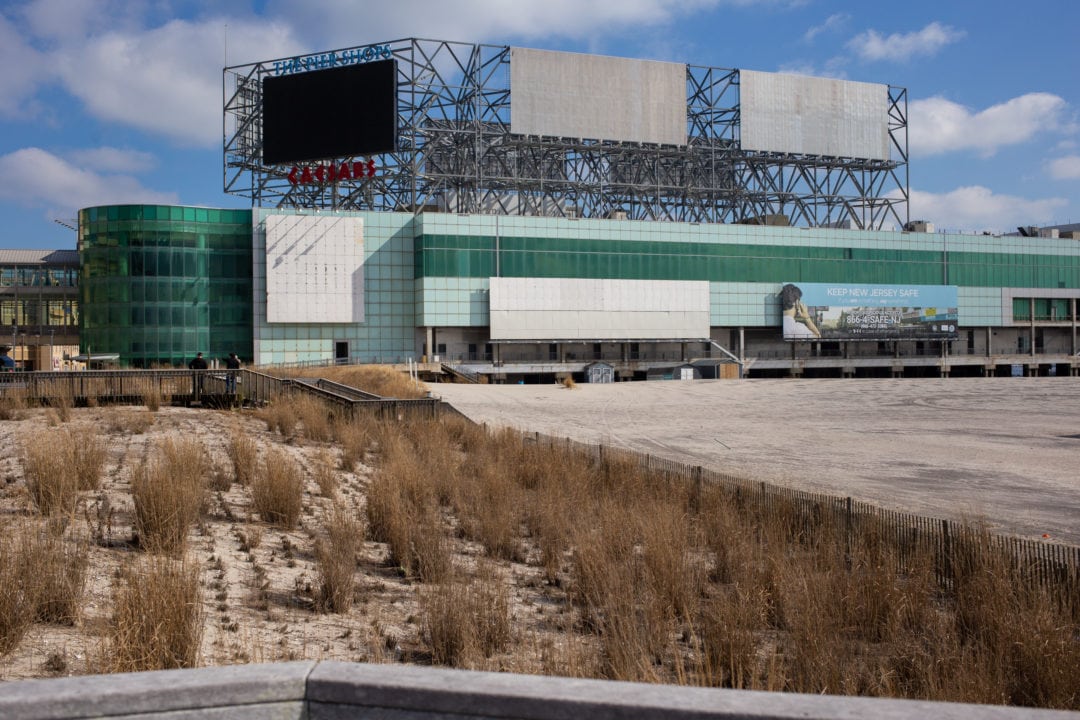
Blank billboards on the beach. | Photo: Alexandra Charitan
On February 17, 2021, a mile away on the Atlantic City Boardwalk, a controlled demolition using nearly 3,000 sticks of dynamite brought down the 34-story tower of what was once the Trump Plaza Hotel and Casino.
Stark contrasts
People looking to roll the dice used to have limited options: Las Vegas in the west, Atlantic City in the east, and Biloxi in between. As gambling became legal in more and more states, towns built around games of chance have seen their luck run out. Las Vegas may be running on a combination of new construction and nostalgia, but the fumes are still potent. Biloxi is backed by the mighty Mississippi and the relative novelty of the riverboat. After its casinos, Atlantic City’s main draw has always been its beach and boardwalk, but increasingly, there are better places for fans of either up and down the East Coast.
Then, a pandemic hit. In mid-March, 2020, New Jersey governor Phil Murphy ordered the casinos closed indefinitely due to COVID-19. The Borgata Hotel Casino and Spa was the city’s last to reopen in July, 2020. Along with the Hard Rock, gamblers wishing to test their luck can still do so at Caesar’s, Bally’s, Showboat, and a handful of other places where the artificially bright lights have almost always seemed to be burning on borrowed time.
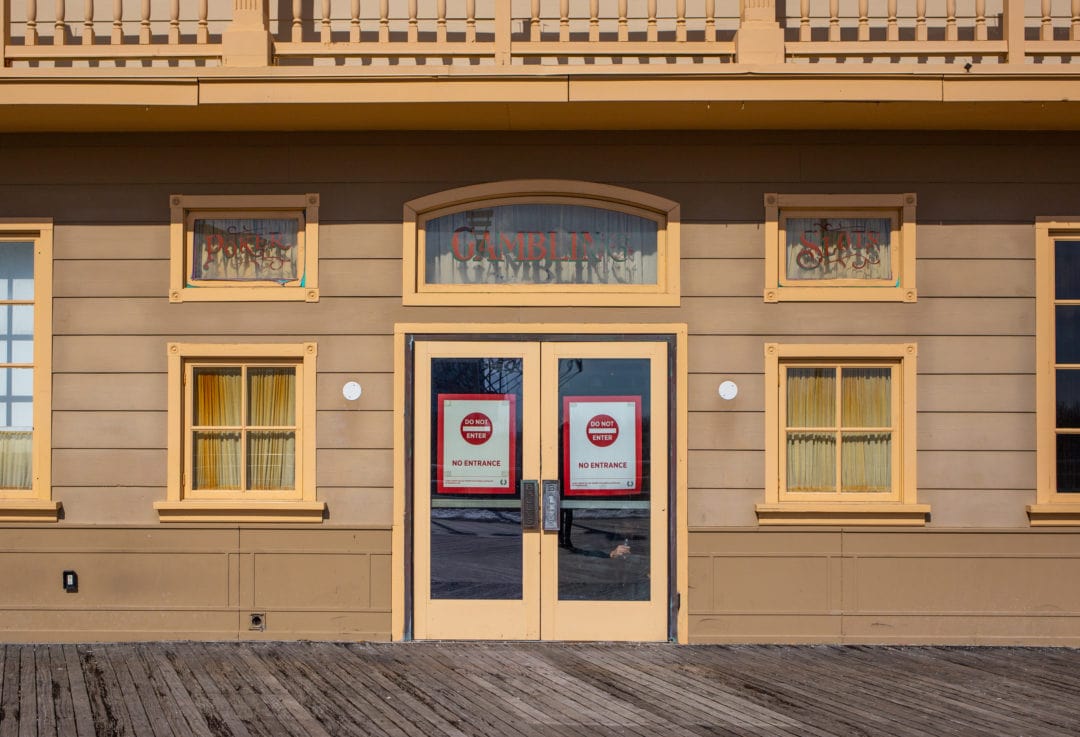
When I return to Atlantic City on a sunny Saturday afternoon in February, it’s too dark inside of the casinos and too bright outside on the boardwalk. Oceanfront communities—like New York’s Coney Island or neighboring shore towns Ocean City and Asbury Park—are often full of stark contrasts. Seasonal amusements act like decorative awnings, temporarily obscuring the inequalities and hardships felt by locals forced to fight over scraps when the tourists leave. Or, like last spring, when they stop coming all together.
The packed parking garage at Caesar’s suggests that tourism, at least in this particular slice of the city, might be on the upswing again. I walk across a skybridge with a view of the Trump Plaza demolition site and through the casino floor to get to the boardwalk—it’s impossible not to, by design. An employee asks where I’m visiting from, aims a thermometer at my forehead, and takes my temperature. “Ninety-eight point five,” he announces loudly, as if the roulette wheel has stopped on my number of choice. “Everyone’s a winner at Caesar’s!”
I appreciate his enthusiasm but I remember he’s being paid to be optimistic; although they do their best to forget it, every gambler knows that in the end, the house always wins. It takes a combination of scrappiness and delusion to survive in resort communities during a normal off-season. It’s unclear how many of the boarded-up businesses are shuttered either directly or indirectly because of COVID-19, but the end result is the same. If Atlantic City was on life support before the pandemic, in early 2021, it feels as if the once-bustling boardwalk is hanging on by an impossibly-thin thread.
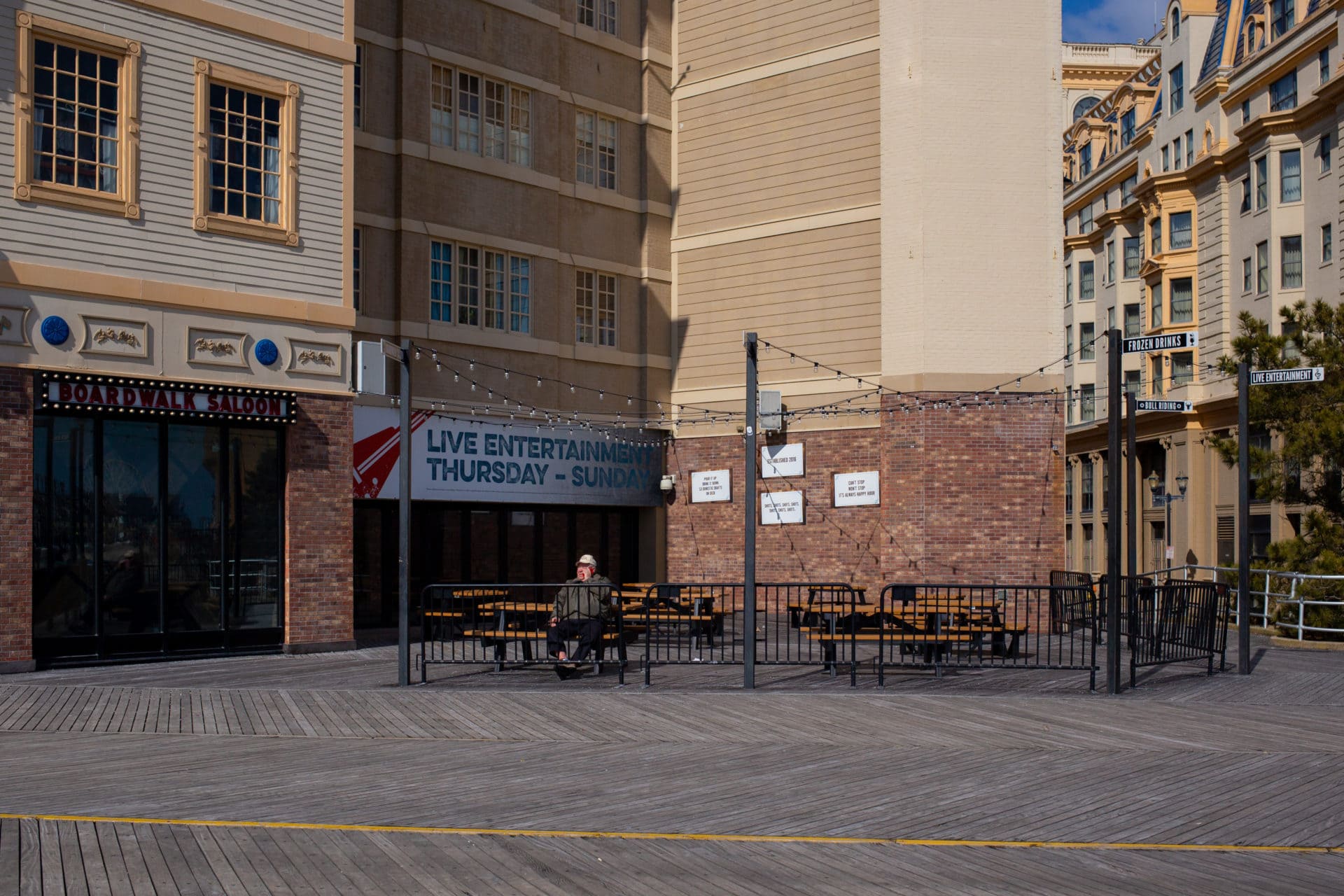
Quit while you’re ahead
Although he distanced himself from his failing casinos in the early 2000s, there is no doubt that Trump’s impact on Atlantic City will linger long after all evidence of his brief reign crumbles to dust. The Hard Rock has successfully erased almost all signs of its ostentatious former tenant, and billionaire investor Carl C. Icahn has grand plans for Trump Plaza’s oceanfront property, which he acquired out of bankruptcy in 2016.
But the casino’s faded, black-and-red, geometric facade still stares blankly across the boardwalk and beyond. Almost all of the windows that had not broken slowly over the years were shattered suddenly by the implosion, which lasted only seconds. Any identifying emblems are long gone, leaving behind only faint impressions of what was once the city’s 10th casino. All that remains of the glittering tower is a debris pile nearly 80 feet high.
-
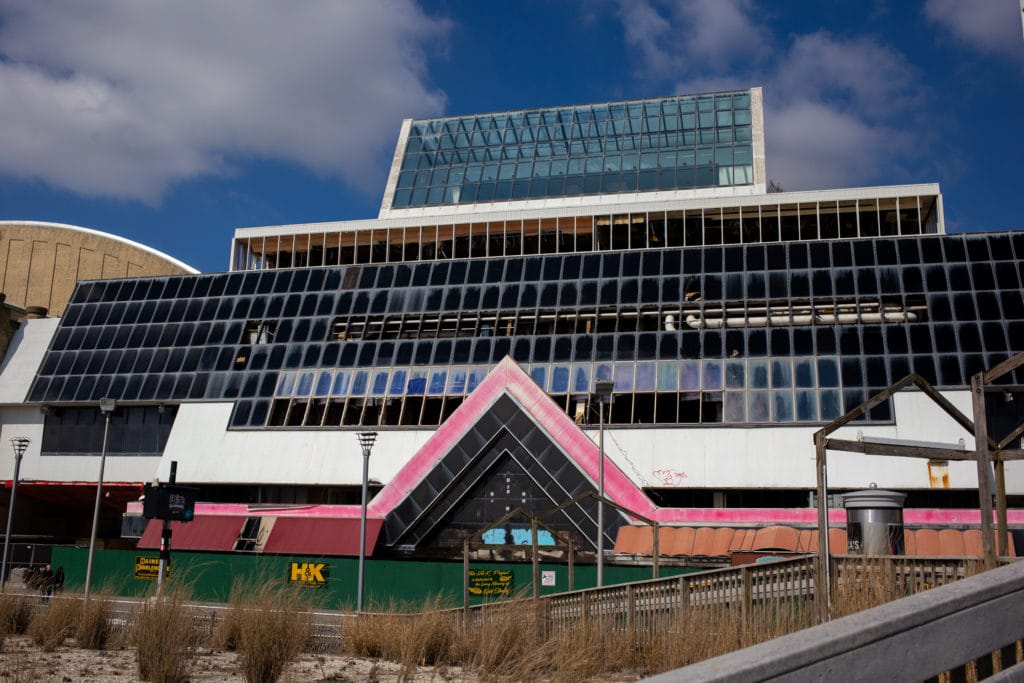
The faded facade of the former Trump Plaza and Casino. | Photo: Alexandra Charitan -
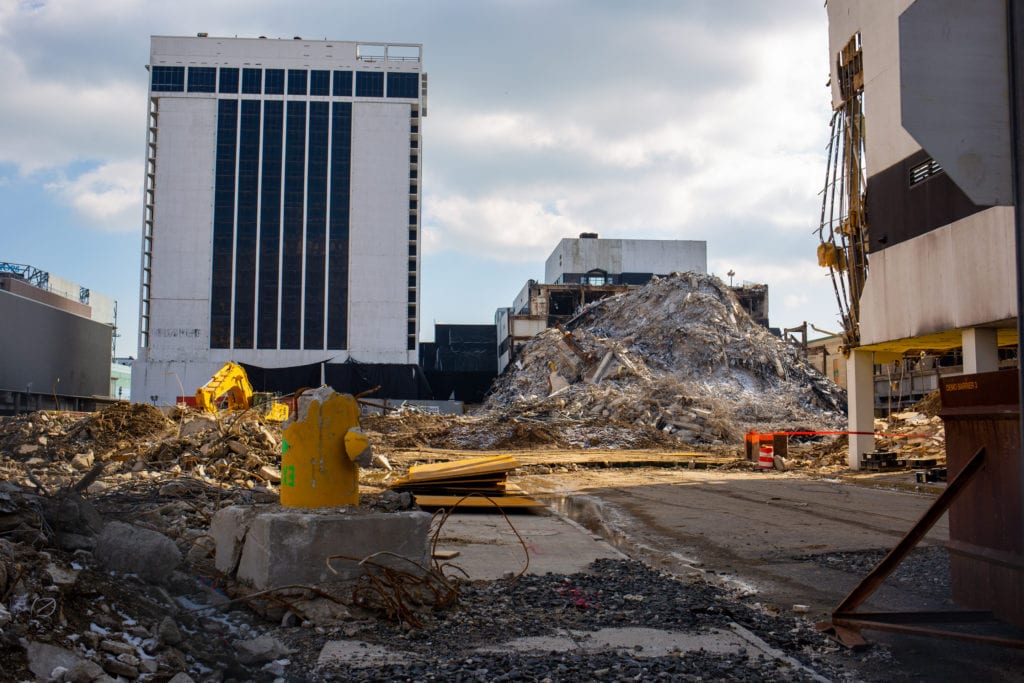
A debris pile nearly 80 feet high is all that’s left of the Trump Plaza tower. | Photo: Alexandra Charitan -
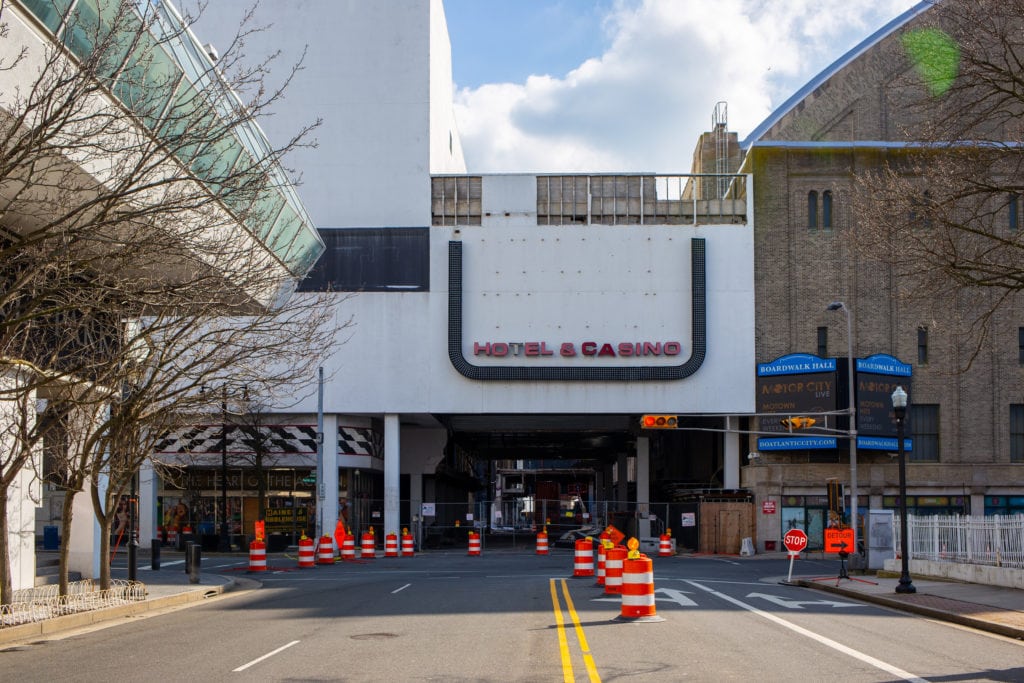
Remnants of Trump Plaza. | Photo: Alexandra Charitan -
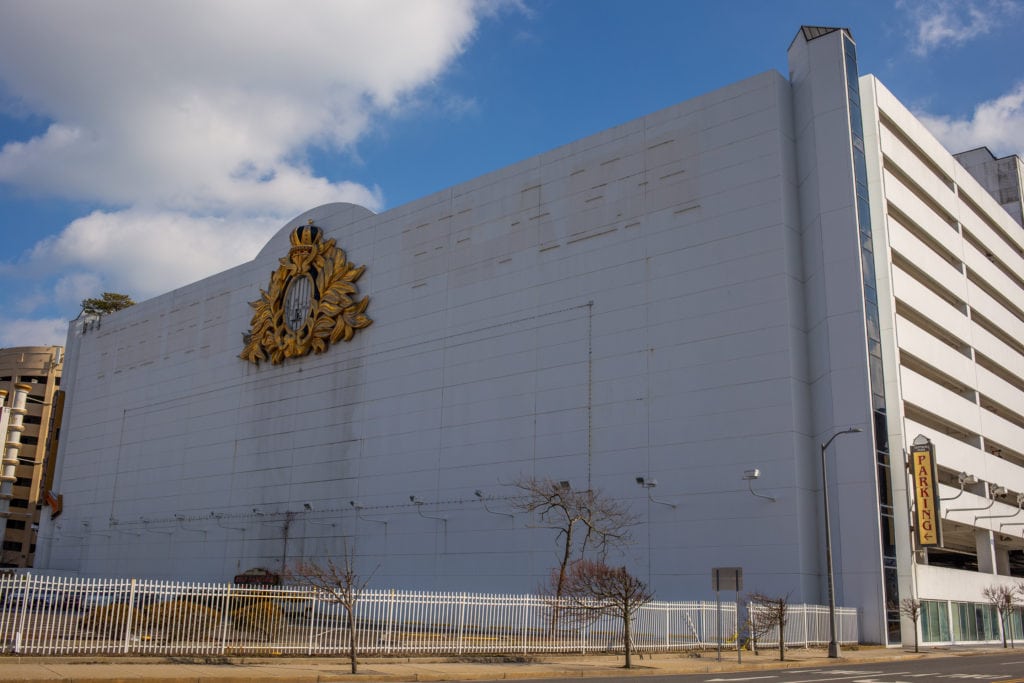
A Trump Plaza parking garage. | Photo: Alexandra Charitan -
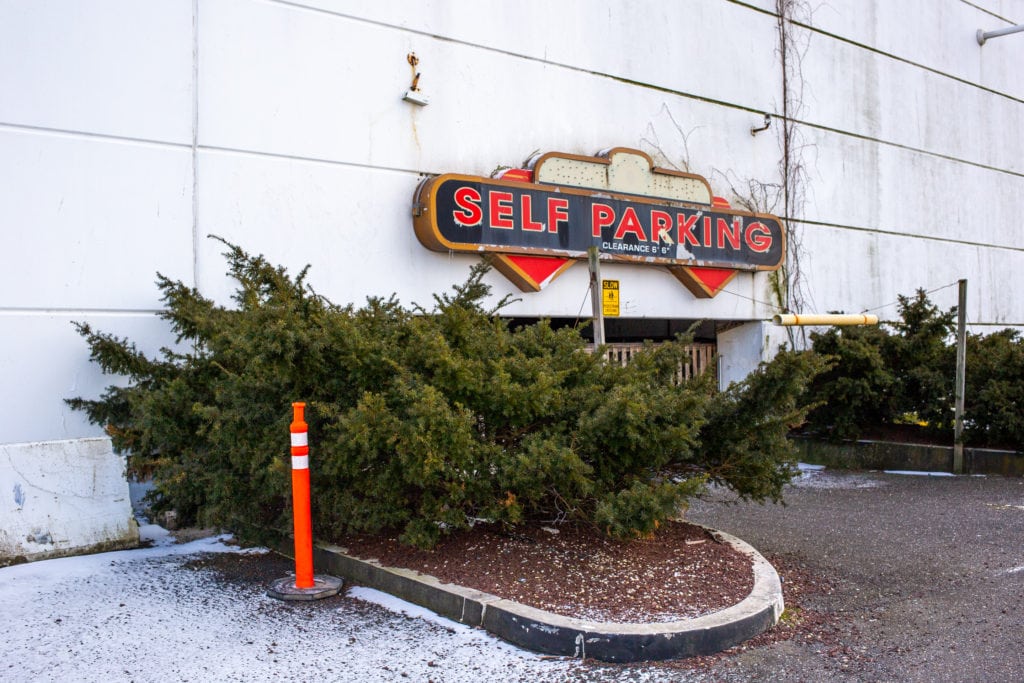
Trump distanced himself from his failing casinos in the early 2000s. | Photo: Alexandra Charitan
Casinos are a confluence of almost everything that has felt forbidden for months: They are gathering places for large groups of strangers eating, drinking, smoking, and shouting (often all at the same time) in close proximity to one another. They are intentionally dark and confusing; even if you could find a window, it likely wouldn’t open. There are seemingly endless ways to enter a casino floor and only a handful of ways to exit. The intricately patterned carpets could disorient even the smartest homing pigeon.
Shortly after I walked through the doors of the desolate Taj Mahal, just days before they closed for good, I spent several minutes watching a bird furiously flapping amidst the reflective ceilings and recessed lighting. We were both desperately searching for a way out; I eventually found one and I can only hope the bird did too. The concept of “quitting while you’re ahead” is always easier said than done—places like Atlantic City are designed to make it almost impossible.
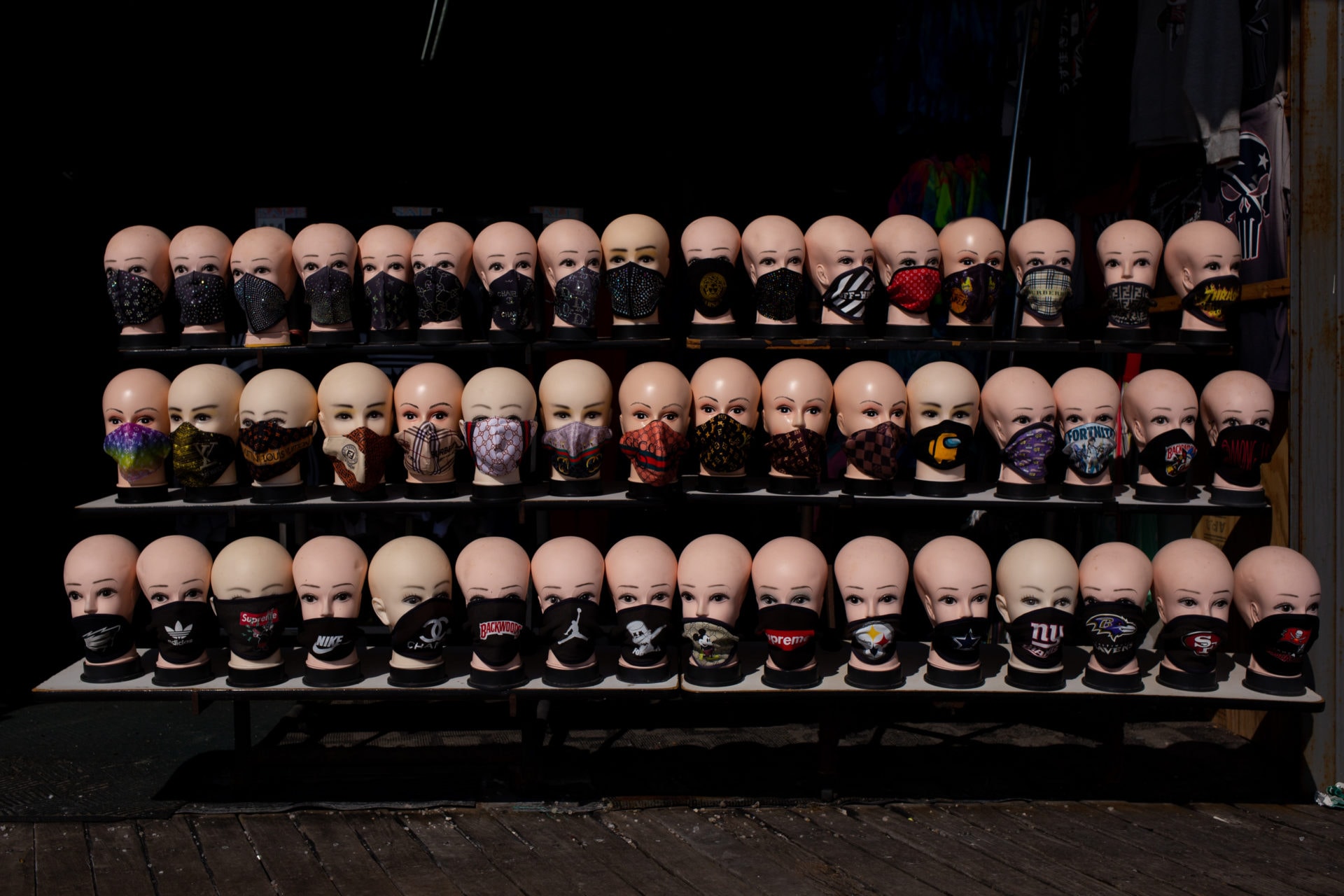
I heart Atlantic City
Today, it’s hard to tell which businesses are closed only for the season or indefinitely, and barely any classic souvenir shops remain. Face masks are more prevalent than flip-flops, billboards are blank, and Psychic Lisa’s mail is piling up beneath her crystal ball. Salt water taffy purveyors James’ Original and Fralinger’s are both closed when I visit. James’ taffy may still be “cut to fit the mouth” elsewhere, but an “Available” sign hangs above the elaborate blue-and-gold marquee at the brand’s boardwalk location.
At Fralinger’s, a mannequin wearing a chef’s hat and facemask stands safely behind glass gilded with letters advertising “sea foam fudge” and “fine chocolates.” His arms are extended and he silently offers passersby a blue-and-white swirled confection; even if there were any takers, there’s no way to accept the free sample. I peer into the dark shop lined with bins of treats and it’s unclear whether time stopped in the summer of 1820 or 2020.

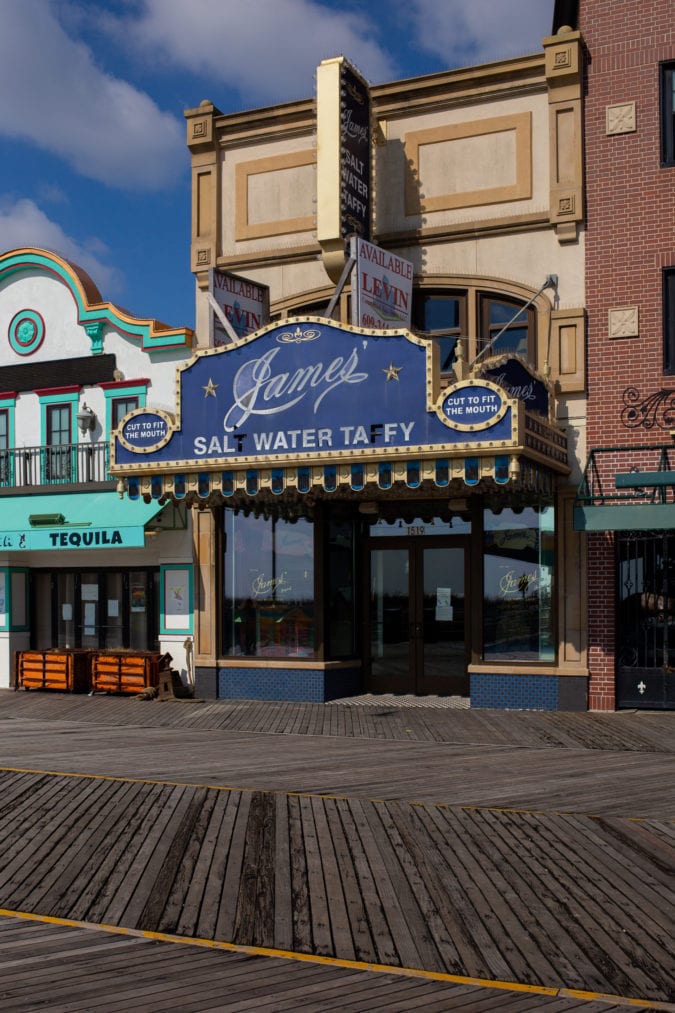
A sign outside of Peanut World is partially obscured by a “For Rent” sign next door, but it’s not hard to solve the puzzle. “Atlantic City’s largest souven[ir shop]” has too many ceiling leaks and not enough customers. Bright blue tarps cover huge swaths of the store, diverting drips into large plastic buckets. I still manage to find several dusty souvenirs worth exchanging my money for—none of which I need and all of which I can’t possibly live without. Outside, I stop to watch two seagulls fight over a discarded French fry. The soundtrack is just stale: Speakers blast the 1982 Bruce Springsteen song “Atlantic City” on a seemingly endless loop.
What happens in Las Vegas may stay in Vegas, but I would argue that the opposite is true of scrappy seaside towns like Atlantic City. I enjoy my brief visit, but it’s not until I return home that I begin to fully appreciate both what has been lost in the past few years and, more importantly, all that still remains. I sip coffee from a slightly-misshapen mug purchased from Peanut World, worth every bit of its 99-cent price tag. With bold black letters, a red heart, and zero irony, the mug declares “I heart Atlantic City.” Despite the odds stacked against me, I have to agree.
Opening my own heart to such a precarious place feels increasingly dangerous, but I can’t help it. I listen to the Springsteen song again and without competition from squawking seagulls, his lyrics go down like a perfect piece of James’ salt water taffy: cut to fit the mouth and best consumed when you’re missing the shore. It may have been included on an album titled Nebraska, but no one can articulate the defiant duality of a down and not-yet-completely-out New Jersey boardwalk as beautifully as the Boss: “Now our luck may have died and our love may be cold … Everything dies, baby, that’s a fact / But maybe everything that dies someday comes back.”
-
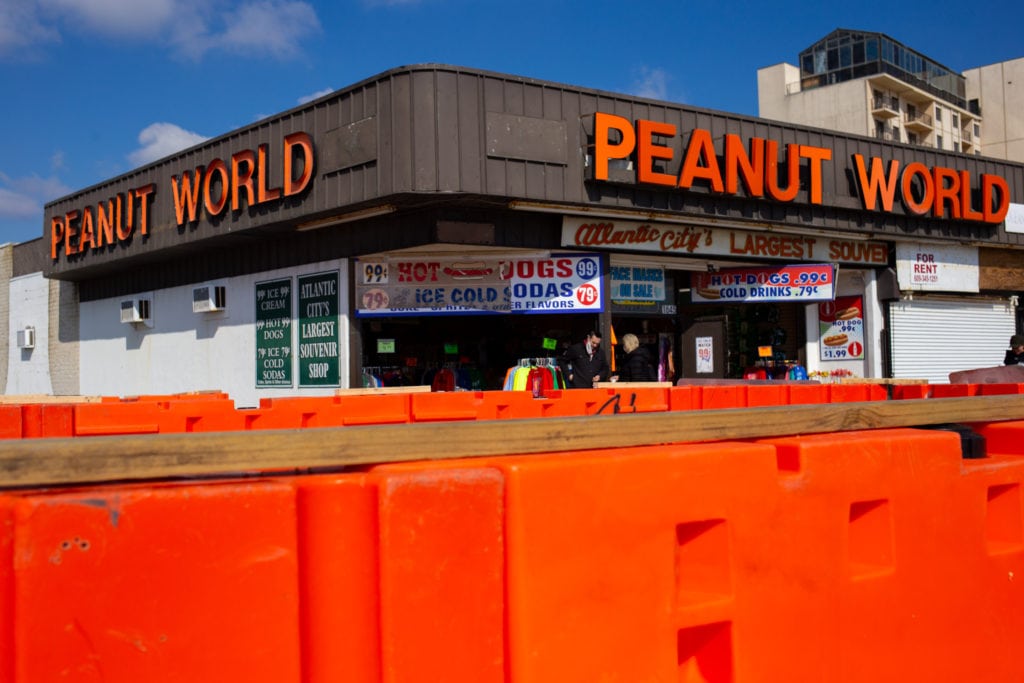
Atlantic City’s largest souvenir shop, Peanut World. | Photo: Alexandra Charitan -
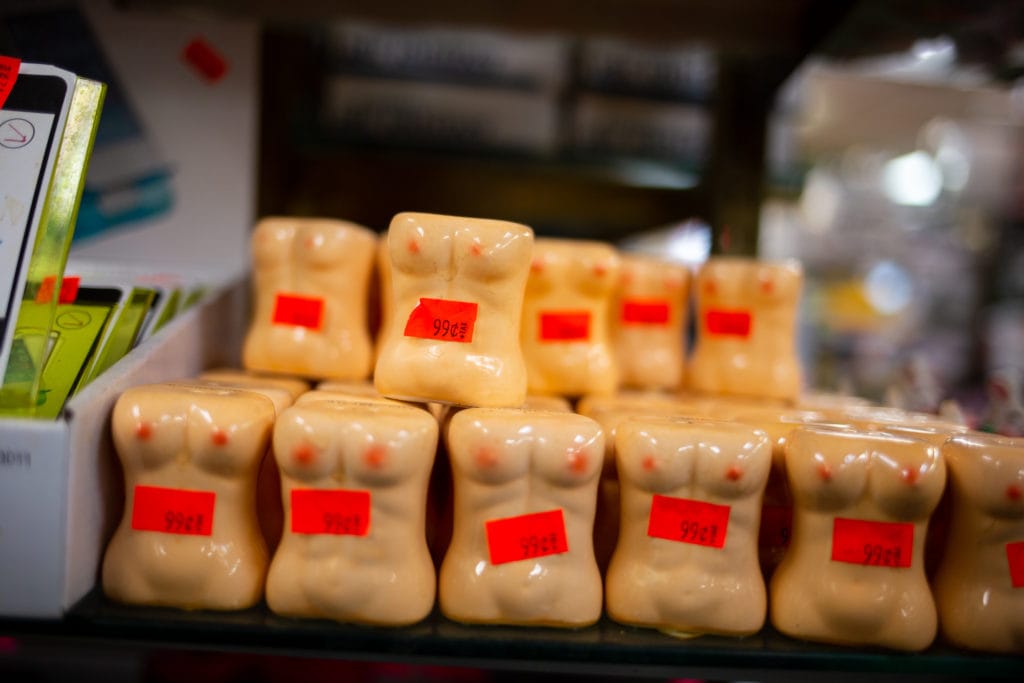
Salt and pepper shakers at Peanut World. | Photo: Alexandra Charitan -
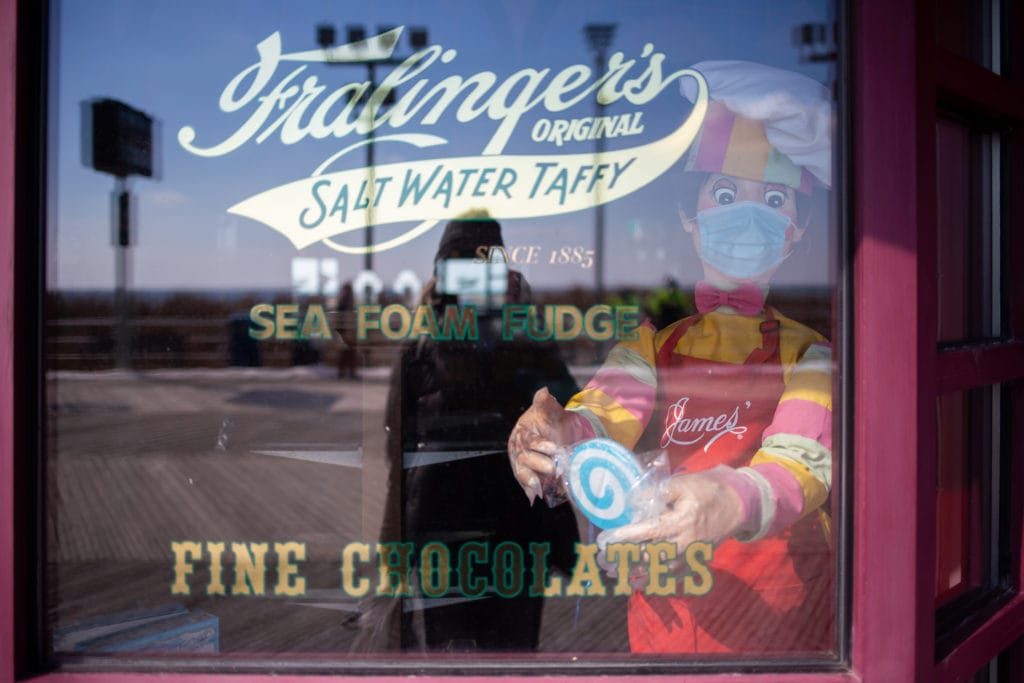
A window display at Fralinger’s boardwalk location. | Photo: Alexandra Charitan -
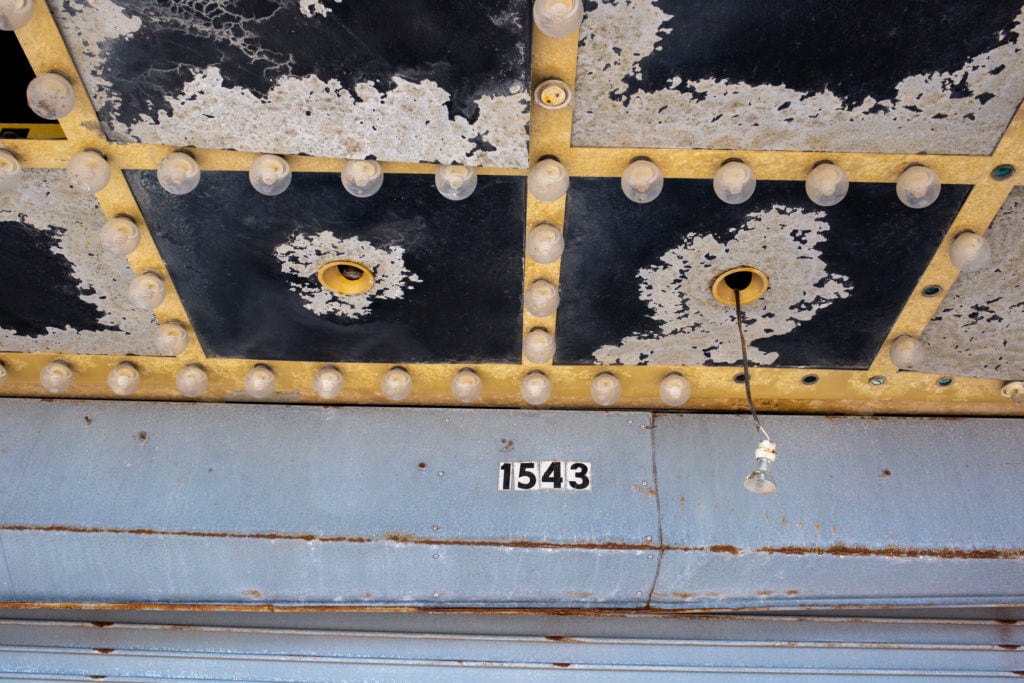
Busted lights outside of a shuttered souvenir shop. | Photo: Alexandra Charitan -
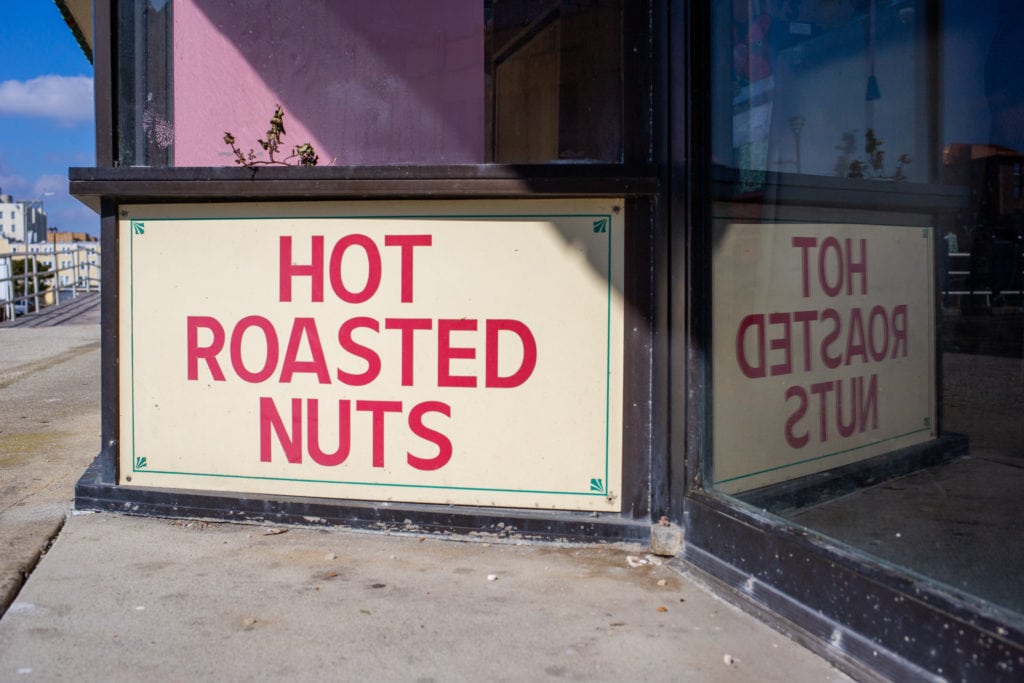
A sign outside of Fralinger’s. | Photo: Alexandra Charitan
